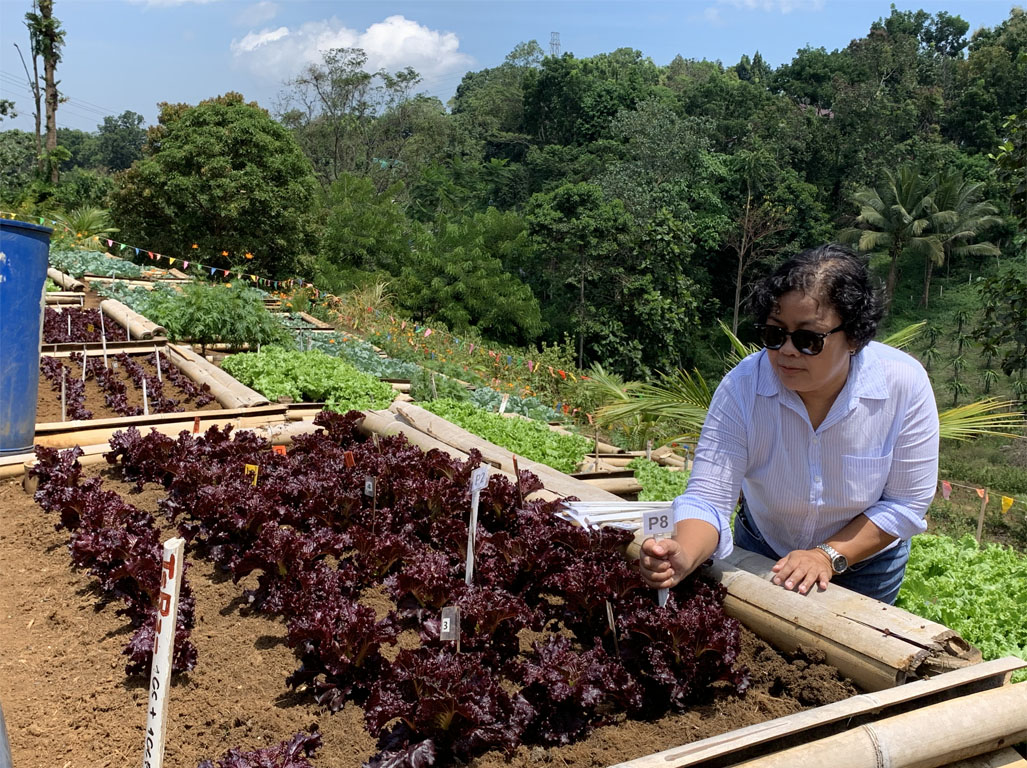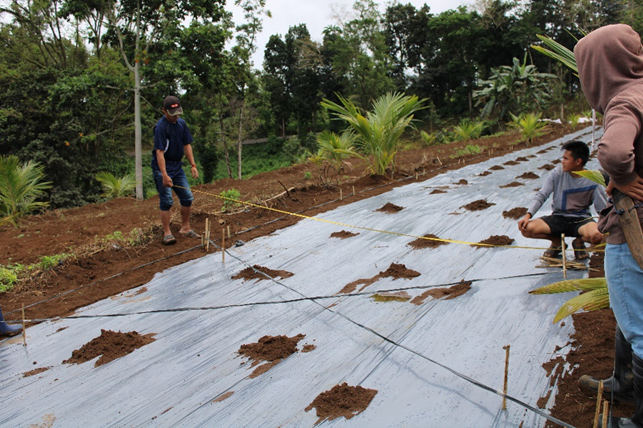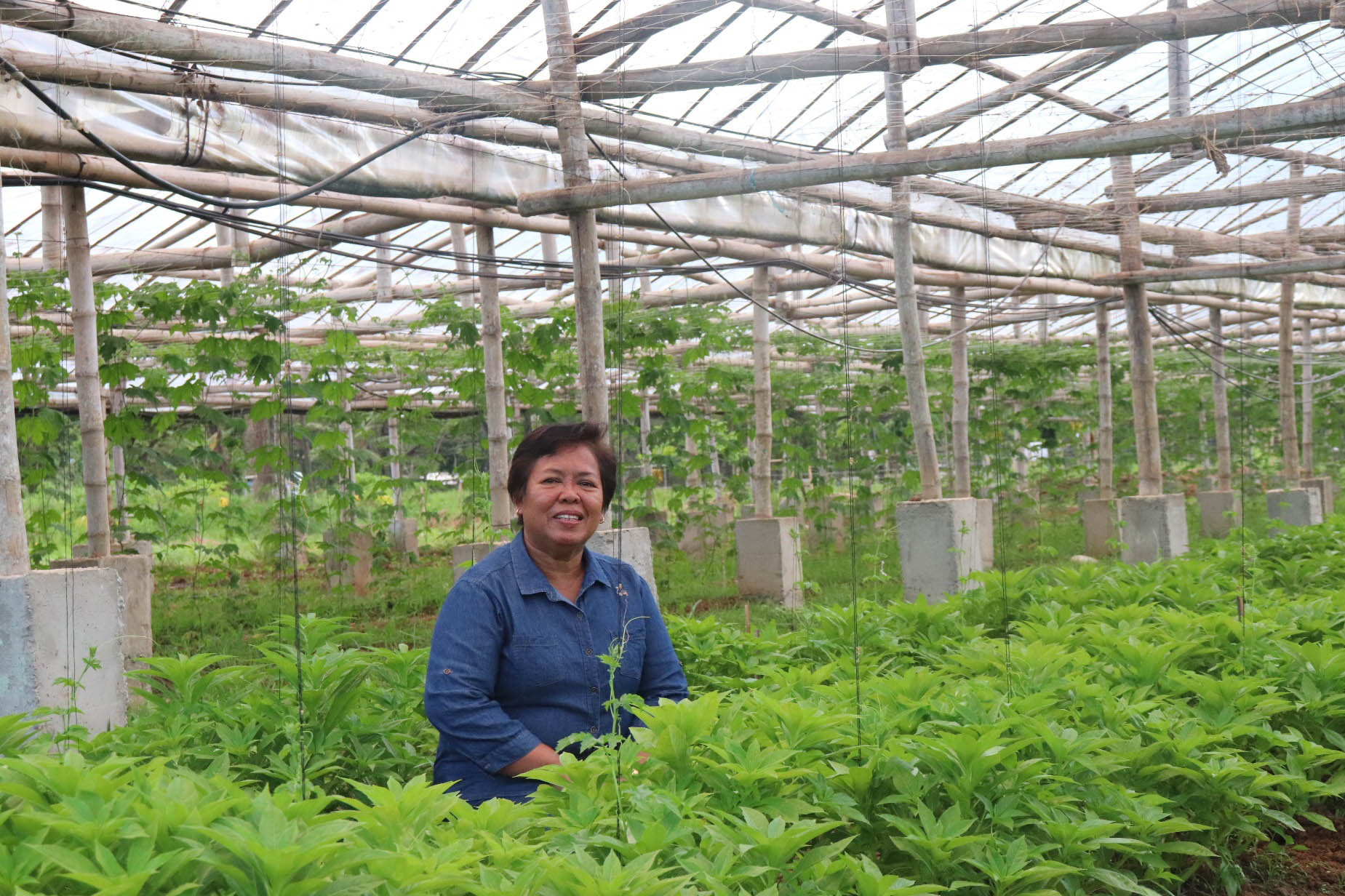When the COVID-19 pandemic sent the Philippines into extended lockdown in April 2020, many rural communities faced strict travel restrictions, limiting people’s ability to reach food markets in nearby villages. In response, the University of Science and Technology of Southern Philippines (USTP) turned to Dr Nelda Gonzaga to help guide these isolated rural communities to learn how to produce food in their own backyards, helping maintain food security during lockdown.
Dr Gonzaga, an alumnus of the 2012 cohort of the John Dillon Fellowship, was able to apply for financial support through the ACIAR Alumni Research Support Facility (ARSF), a quick-response initiative to build resilience in food systems as the pandemic unfolded.
Leading her team at USTP, Dr Gonzaga worked with local communities to establish a new farming model for rural households based on community coordination and sustainability. Aptly named the Productive Agriculture for National Development through Entrepreneurial Mindset and Innovative Culture Farm (PANDEMIC), the model has significantly contributed to food security resilience.
‘PANDEMIC is a model farm that local households can replicate for survival and sustainability in the event of future crises,’ says Dr Gonzaga, faculty-researcher of USTP in Claveria, Misamis Oriental province in Mindanao.

‘This initiative is also a strategy to encourage families who were affected by the pandemic to produce adequate, accessible, and affordable food on their own.’
Dr Gonzaga’s project focused on establishing resilient and innovative community food production systems such as vertical gardening, container gardening, square-foot gardening, and raised-bed gardening and evaluating their sustainability and efficiency.
Community-based solutions, community efforts
‘We looked at these agricultural production systems because they can empower communities to produce their own food in their backyards, lessening their dependence on the crops that are available in the markets. They also have potentially greater yields per area compared to conventional agriculture, can be made using locally-sourced materials, and have less harmful effects on the environment,’ says Dr Gonzaga.
Like many scientists conducting research during the pandemic, Dr Gonzaga and her team faced extra logistical challenges.
‘In the first few months of project implementation, we faced delays in the procurement of materials because of community lockdowns, which also prevented our mobility. My team and the students, who are involved in our project as part of their thesis, were supposed to visit model farms in surrounding areas to learn how to set up these food production systems, but we were unable to go,’ says Dr Gonzaga.
‘We realised, however, that we could not let this pandemic bring us down and discourage us from doing research. We looked at alternative learning materials online, and we learned from there.’
When the lockdown travel restrictions eased, Dr Gonzaga and her team set up a demonstration site on campus, with examples of various agricultural production systems appropriate for both rural and urban households. These systems were planted with “pinakbet” vegetables – eggplant, okra, squash, string beans, and ampalaya (bitter melon). Pinakbet is a staple vegetable dish in the Philippines, and most of its ingredients are easily accessible and could be grown in the backyard gardens of most Filipino households.

Dr Gonzaga’s team also established an edible landscaping system, which adds function to standard landscape designs by integrating edible plants. In essence, it is food production with added aesthetic value and is commonly associated with leisure farming. Crops used for this system involves leafy-type vegetables such as upland kangkong, pechay (Napa cabbage), cabbage, spring onion, and various varieties of lettuce – adding vibrant colours to the landscape.
Harnessing digital platforms for local learning
The community quarantine restrictions meant that farmers could not get together for ‘Farmers Field Day’, an event that brings together farmers to engage in shared learning activities. As an alternative approach to enable farmers to continuously learn, Dr Gonzaga’s team utilised online media platforms to reach out to various stakeholders and communicate their research results.
As of October 2021, the PANDEMIC Farm videos were able to reach more than one thousand farmers and community members. The USTP also arranged for these videos to be shown in community COVID-19 vaccination sites, while people waited to receive their vaccination.
Local government and education partners expressed interest in using the videos in the technical-vocational education programs such as “Gulayan sa Paaralan / Gulayan sa Tahanan” (vegetable gardens at school and at homes).
Inspired by the positive reaction from the communities, USTP is now developing the PANDEMIC Farm into a learning site for agriculture (LSA) and as a farm school through linkages with government agencies such as the Department of Agriculture-Agricultural Training Institute and Technical Education and Skills Development Authority. With Dr Gonzaga at the helm, the university is also considering developing the project site as an agritourism farm as part of its sustainability strategy and as a springboard for USTP in its aim to be globally competitive.
Dr Gonzaga says having a platform to be an instrument of change is the greatest advantage of being an ACIAR alumni.

‘With the ARSF, we are fortunate that ACIAR support continues in our leadership journey on agricultural research for development. This project has been a window towards serving the purpose of becoming relevant to the community in this time of global crisis.
‘This pandemic has taught us multitudes of reasons on how to be resilient, creative, and still be productive despite the crisis. Likewise, it taught everyone one basic thing – food production is still central to everyone’s life.’
ACIAR established the ARSF in 2020 to respond to the COVID-19 pandemic. The ARSF enabled alumni of ACIAR fellowships to pursue relevant research to help build resilience and respond to the challenges brought by the pandemic to agricultural systems in ACIAR partner countries.
Moreover, it allowed for continuous capacity building of alumni as an Australian mentor worked with each research team to provide technical advice where needed. The ARSF supported three women researchers from the Philippines. Learn more about the ARSF.






